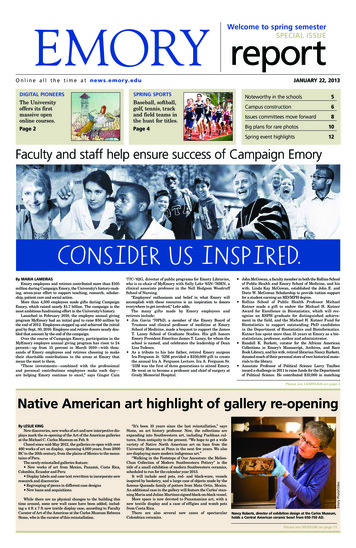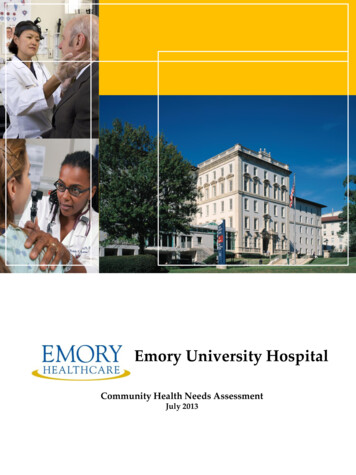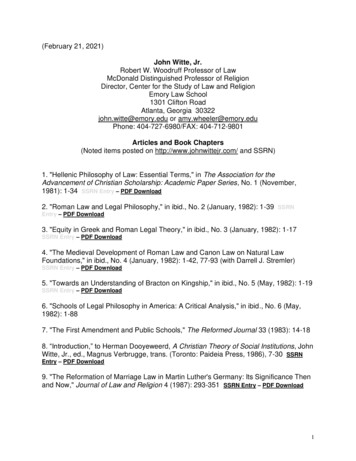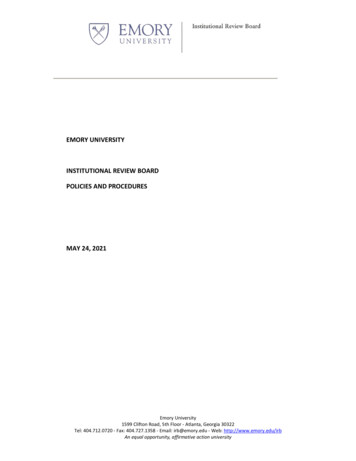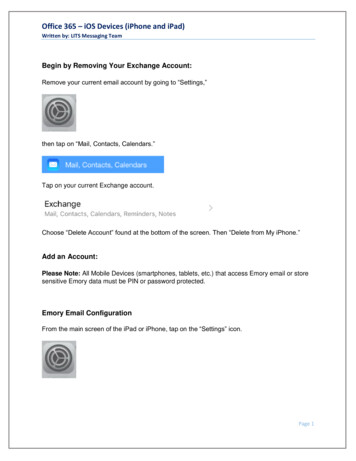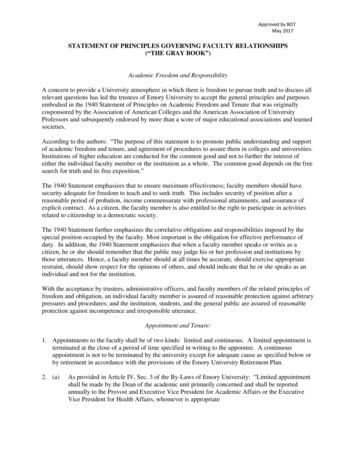
Transcription
Approved by BOTMay 2017STATEMENT OF PRINCIPLES GOVERNING FACULTY RELATIONSHIPS(“THE GRAY BOOK”)Academic Freedom and ResponsibilityA concern to provide a University atmosphere in which there is freedom to pursue truth and to discuss allrelevant questions has led the trustees of Emory University to accept the general principles and purposesembodied in the 1940 Statement of Principles on Academic Freedom and Tenure that was originallycosponsored by the Association of American Colleges and the American Association of UniversityProfessors and subsequently endorsed by more than a score of major educational associations and learnedsocieties.According to the authors: “The purpose of this statement is to promote public understanding and supportof academic freedom and tenure, and agreement of procedures to assure them in colleges and universities.Institutions of higher education are conducted for the common good and not to further the interest ofeither the individual faculty member or the institution as a whole. The common good depends on the freesearch for truth and its free exposition.”The 1940 Statement emphasizes that to ensure maximum effectiveness; faculty members should havesecurity adequate for freedom to teach and to seek truth. This includes security of position after areasonable period of probation, income commensurate with professional attainments, and assurance ofexplicit contract. As a citizen, the faculty member is also entitled to the right to participate in activitiesrelated to citizenship in a democratic society.The 1940 Statement further emphasizes the correlative obligations and responsibilities imposed by thespecial position occupied by the faculty. Most important is the obligation for effective performance ofduty. In addition, the 1940 Statement emphasizes that when a faculty member speaks or writes as acitizen, he or she should remember that the public may judge his or her profession and institutions bythose utterances. Hence, a faculty member should at all times be accurate, should exercise appropriaterestraint, should show respect for the opinions of others, and should indicate that he or she speaks as anindividual and not for the institution.With the acceptance by trustees, administrative officers, and faculty members of the related principles offreedom and obligation, an individual faculty member is assured of reasonable protection against arbitrarypressures and procedures; and the institution, students, and the general public are assured of reasonableprotection against incompetence and irresponsible utterance.Appointment and Tenure:1. Appointments to the faculty shall be of two kinds: limited and continuous. A limited appointment isterminated at the close of a period of time specified in writing to the appointee. A continuousappointment is not to be terminated by the university except for adequate cause as specified below orby retirement in accordance with the provisions of the Emory University Retirement Plan.2. (a)As provided in Article IV, Sec. 3 of the By-Laws of Emory University: “Limited appointmentshall be made by the Dean of the academic unit primarily concerned and shall be reportedannually to the Provost and Executive Vice President for Academic Affairs or the ExecutiveVice President for Health Affairs, whomever is appropriate
Approved by BOTMay 2017“Continuous appointments shall be made by the Board of Trustees or its Executive Committeeupon the recommendation of the President who shall have conferred regarding suchrecommendation with the Dean of the academic unit primarily concerned and the appropriateacademic Executive Vice President. “The deans shall establish and communicate to theirfaculty the procedures for expressing faculty opinion in matters of individual appointment,promotion and termination. The precise terms and conditions of each appointment shall bestated in writing, shall be in accordance with the principles approved and published by theBoard of Trustees, and shall be in possession both of the University and the appointee beforethe appointment is final.”(b)Copies of the procedures mentioned above shall be filed with the Provost and Executive VicePresident for Academic Affairs, the Executive Vice President for Health Affairs, whenappropriate, and the Executive Committee of the Faculty Council.3. The Continuous Appointment Track: Except as otherwise provided herein, the following conditionsshall apply to full-time appointments in the ranks of professor, associate professor, assistantprofessor, and instructor:(a)Appointments to the rank of professor shall be continuous.(b)Appointments to the rank of associate professor may be continuous or limited. Limitedappointments at the rank of associate professor shall not exceed five years.(c)Appointments to the ranks of assistant professor on the tenure track and instructor shall belimited.(d)The duration of a limited appointment at the rank of assistant professor at Emory is establishedby the school or college in which the faculty member is appointed and is described in the tenurepolicies for that school. The time period is typically counted from the date of appointment. Incertain cases, the years may be counted from the time the terminal degree is received. When aformal extension of the tenure clock has been granted, the time spent in a limited appointmentmay be extended beyond the school’s stated time period.(e)Standards for appointments at rank, along with promotion and tenure, reflect the expectationsthat a faculty holds of its members. Each academic unit will set forth specific rules andguidelines for attaining a continuous appointment or promotion. Candidates for appointment orpromotion to Associate Professor must show academic excellence, including meritoriousscholarship, creative inquiry, and outstanding teaching, as well as have the demonstratedpromise to become leaders and transform their field as their career progresses. Candidates forappointment or promotion to Professor must show scholarly excellence and be established,nationally or internationally, as among the most distinctive and recognized voices in theirdisciplines, consistently examining and addressing their fields’ most pressing questions.4. The Limited Appointment Track: Appointment to the rank of professor (clinical), associate professor(clinical), assistant professor (clinical), instructor (clinical), professor (research), associate professor(research), assistant professor (research), instructor (research), professor (medical educator andservice), associate professor (medical educator and service), assistant professor (medical educator andservice), professor of practice, professor of pedagogy, or professor of performance), and instructorshall be limited. Limited appointments as Senior Associate and Associate only are used in the health
Approved by BOTMay 2017sciences.*Such appointments carry no restrictions on years of service in these ranks and may bereserved for those individuals who serve in specialized capacities in which advancement tocontinuous appointment would not ordinarily be anticipated. Specific rules and guidelines forappointment and promotion on these limited appointments are set forth by each academic unit.5. In cases where appointment to one of the ranks enumerated above is inappropriate, the title oflecturer, special lecturer, senior lecturer may be given by the Dean of the academic unit primarilyconcerned and shall be reported annually to the Provost and Executive Vice President for AcademicAffairs. Such appointment shall be limited.6. Visiting, part-time, temporary, and uncompensated appointments are governed by the writtenconditions of each individual appointment but shall, in all cases, be limited. Such appointments shallnot exceed three years and shall be reported annually to the Provost and Executive Vice President forAcademic Affairs. In the School of Medicine, two-year appointments of uncompensated volunteerfaculty may be renewed based on performance and need.Appointments using the acting title Acting Associate Professor or Acting Professor shall be used onlyfor new faculty members at the rank of Associate Professor or Professor whose tenure decision ispending review by the Board of Trustees or its Executive Committee.7. The terms of the limited appointment shall be stated in writing. Written notice of renewal for alimited appointment shall be provided by the Dean of the academic unit primarily concerned and shallbe reported annually to the Provost and Executive Vice President for Academic Affairs or theExecutive Vice President for Health Affairs. Written notice of non-renewal for a limited appointmentshall be provided by the Dean of the academic unit primarily concerned and shall be reportedannually to the Provost and Executive Vice President for Academic Affairs or the Executive VicePresident for Health Affairs ideally six months, but at a minimum three months in advance of the endof the appointment. .8. In each case the Dean of the academic unit primarily concerned shall have conferred regarding anyrecommendation for appointment and, promotion for continuous faculty, appointments or nonrenewalof a limited faculty appointment with members of the department or faculty concerned, according toprocedures, which shall have been previously established and communicated to the faculty.9. A member of the faculty who intends to resign shall give notice in ample time, preferably at least oneacademic semester, to permit the university to plan accordingly.10. A member of the faculty who has served on a regular full-time basis continuously for a period of tenor more years and who is at least age fifty-five, and whose total age and years of continuous serviceequals at least seventy-five, may retire at the end of any semester at the option of the faculty member.Under unusual circumstances, appointments may be extended to retired faculty on a year-to-yearbasis by the Dean of the academic unit.11. A retired member of the faculty who has reached age fifty-five and has served as a member of theEmory faculty for at least ten continuous years, and whose total age and years of continuous serviceequal at least seventy-five, may be considered for an “emeritus” title that reflects rank andappointment track at the time of retirement. Following rules and guidelines for academic titles, theDean of the academic unit where the faculty member’s appointment is housed may recommend a*The use of the senior associate and associate title for limited faculty appointments currently is underreview.
Approved by BOTMay 2017faculty member to the Provost and Executive Vice President for Academic Affairs and the President,who shall inform the Board of Trustees, if awarded.12. Continuous appointments may be terminated:(a) By resignation;(b) By retirement in accordance with the provisions of the Emory University Retirement Plan;(c) For one or more of the following reasons: moral delinquency, neglect of academic duty,incompetence, permanent physical or mental incapacity for which there is no reasonableaccommodation, or other such adequate cause.13. The Executive Committee of the Faculty Council, in consultation with the Provost and ExecutiveVice President for Academic Affairs, shall select five members of the tenured faculty to serve as theFaculty Hearing Committee. The Faculty Hearing Committee shall conduct hearings, make findingsof fact, and make recommendations to appropriate university officers when a faculty member’semployment is or may be suspended, transferred or terminated for any reason specified in Paragraph12(c) above or Paragraph 14 below. When a faculty member seeks review for a reason listed underparagraph 14 below, the jurisdiction of the Faculty Hearing Committee shall be limited to whether theindividual faculty member has been treated in a manner that is arbitrary or capricious and shall notextend to an inquiry in to the propriety of any action by the board of Trustees under paragraph 14(a)or (c) or of the president under paragraph 14(b). The methods of invoking jurisdiction of the FacultyHearing Committee, the procedures to be employed by it, and additional regulation of its membershipand responsibilities shall be established by resolution of the Faculty Council approved by thepresident of the university.14. Nothing in the provisions set forth above shall be interpreted as restricting:(a) The right of the Board of Trustees under extraordinary circumstances to discontinue anyacademic program, department, or unit of the university.(b) The right of the President and the Provost and Executive Vice President for Academic Affairs,after conference with the appropriate Dean, and when appropriate, department chairs, to assignany faculty member to any appropriate position, provided no such assignment shall carry with itreduction in rank or change of status as to tenure.15. It is the express desire and purpose of the President and the Board of Trustees to use the powersexpressly reserved (Paragraph 14 above) only in cases of the utmost necessity, when failure to usesuch powers would adversely affect the interest of the university.16. A faculty member on continuous appointment, whose appointment is terminated on the initiative ofthe university for reasons not involving moral delinquency, shall receive his or her salary for one yearfrom the date of notification of termination, or until such time, within one year, as he or she may haveentered into other employment, or commenced receipt of disability income insurance.17. The provisions set forth above shall not apply to administrative offices. Appointment to, orretirement from, such offices shall not deprive faculty members of their tenure in the highest rank inwhich they have served prior to or during their service in administrative office.
Approved by BOTMay 201718. Promotion: Promotion is based upon departmental needs and upon the faculty member’s growthin professional competence and increased service to the university. Recommendations forpromotion are made by the dean of the school for college primarily concerned as provided inParagraph 2 above.19. Leaves of Absence: Emory strongly encourages faculty members to take such leaves of absenceas may benefit themselves and the university. At intervals of at least six years of continuous serviceat Emory University, leaves of absence may be granted for a half year on full pay or for a year onhalf pay by the Dean of the academic unit. Other leaves of absence may be granted on such terms asmay appear justified in individual cases.20. In conformity with paragraphs 2(a), 2(b), 3 and 8 of this “Statement of Principles Governing FacultyRelationships,” the Dean and Faculty of each School and Division have established more detailedprocedures for appointments, promotions and tenure. Members of the faculty are urged to securecopies of such procedures to their appointments and become familiar with them.21. Definition of “year(s)” and “year(s) of service.” Throughout the “Statement of PrinciplesGoverning Faculty Relationships,” the terms “year(s)” and “year(s) of service” shall be construedbased on the start date of employment as a faculty member at Emory.
2. (a) As provided in Article IV, Sec. 3 of the By-Laws of Emory University: "Limited appointment shall be made by the Dean of the academic unit primarily concerned and shall be reported annually to the Provost and Executive Vice President for Academic Affairs or the Executive Vice President for Health Affairs, whomever is appropriate
